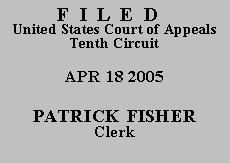

| GILBERT DEAN DAVIS,
Plaintiff - Appellant, v. CORRECTIONS CORPORATION OF AMERICA; CHARLES RAY, Warden; BILL BOYD, Assistant Warden; EZELL, Deputy Warden, Defendants - Appellees. |
|
Gilbert Dean Davis is a prisoner in the custody of the Oklahoma Department of Corrections (DOC), housed in the Davis Correctional Facility under a contract between the Corrections Corporation of America (CCA) and the DOC. Mr. Davis filed a pro se civil rights complaint requesting injunctive relief under 42 U.S.C. § 1983. He alleged defendants violated his constitutional rights by interfering with his practice of Islam and disciplining him without due process of law.(1) The district court entered summary judgment against Mr. Davis on two grounds: failure to exhaust administrative remedies and, with regard to disciplinary proceedings, lack of cognizable due-process violations. We affirm.
Under the Prison Litigation Reform Act (PLRA), 42 U.S.C. § 1997e(a), an inmate must exhaust available administrative remedies before filing a civil-rights suit with respect to prison conditions. See Steele v. Fed. Bureau of Prisons, 355 F.3d 1204, 1206 (10th Cir. 2003). Mr. Davis claimed he had exhausted available administrative remedies and, as proof, attached four documents arising from the prison grievance system.
The district court ordered preparation of an investigative report pursuant to Martinez v. Aaron, 570 F.2d 317, 319 (10th Cir. 1978) (stating district court may order prison officials to file investigative reports in prisoner civil rights suits). The Martinez report set out the prison's multi-step grievance procedure and described Mr. Davis's inconsistent approach to the process. Supporting documentation demonstrated that, although Mr. Davis had filed several grievances on an assortment of issues, he had not pursued any grievance to exhaustion.
Defendants moved for summary judgment, in part on the ground that Mr. Davis failed to exhaust his administrative remedies. Mr. Davis responded that officials had refused to provide him with writing materials or "the rules to be followed," Rec., doc. 17 at 1, and that one individual had given him faulty advice. Id. He also claimed he had difficulty "in preparing and filing legal papers" because he is "a slow learner and thinker and is currently enrolled in class to receive his G.E.D." Id., doc. 23 at 2. The district court determined that Mr. Davis had "failed to make any viable argument that he ha[d] exhausted his administrative remedies as to the claims brought in his complaint," id., doc. 25, at 11, and granted defendants' motion for summary judgment. This appeal followed.
In this court, Mr. Davis re-asserts and expands upon his argument that his educational deficiencies make compliance with the grievance system problematic.(2) We note, however, that Mr. Davis's district court submissions did not describe insurmountable barriers to his filing of grievances and did not show that prison officials had effectively foreclosed his efforts. See Steele, 355 F.3d at 1214. Indeed, the record demonstrates that Mr. Davis had initiated several grievance proceedings. "An inmate who begins the grievance process but does not complete it is barred from pursuing a § 1983 claim . . . for failure to exhaust his administrative remedies." Jernigan v. Stuchell, 304 F.3d 1030, 1032 (10th Cir. 2002). Thus, summary judgment, "limited to the narrow issue of exhaustion and the prisoner's efforts to exhaust," was the appropriate disposition of Mr. Davis's claims, Steele, 355 F.3d at 1212, particularly given that a dismissal for failure to exhaust administrative remedies does not preclude curing the defect if that is still a viable option. Id. at 1212-13.
The district court also evaluated the merits of a subset of Mr. Davis's claims. Based upon Supreme Court precedent, the court determined defendants were entitled to summary judgment on Mr. Davis's allegations of due process violations. "Prison disciplinary proceedings are not part of a criminal prosecution, and the full panoply of rights due a defendant in such proceedings does not apply." Wolff v. McDonnell, 418 U.S. 539, 556 (1974). For a prison disciplinary hearing which may result in the loss of a liberty interest, due process requires that the inmate receive "(1) advance written notice of the disciplinary charges; (2) an opportunity, when consistent with institutional safety and correctional goals, to call witnesses and present documentary evidence in his defense; and (3) a written statement by the factfinder of the evidence relied on and the reasons for the disciplinary action." See Superintendent, Mass. Corr. Inst., Walpole v. Hill, 472 U.S. 445, 454 (1985) (citing Wolff, 418 U.S. at 563-67). The findings also must be "supported by some evidence in the record." Id.
Mr. Davis does not argue that his disciplinary proceedings lacked any of these procedural protections. Moreover, we agree with the district court that there exists "some evidence" to support the conclusions reached during the disciplinary hearings. Rec., doc. 25 at 12. The court correctly entered summary judgment on the merits of Mr. Davis's due process claims.
Accordingly, after consideration of the record on appeal, the parties' briefs, and the district court's order, we AFFIRM the judgment of the district court. We DENY Mr. Davis's motion to strike appellees' response brief.
Entered for the Court
Stephanie K. Seymour Circuit Judge
*. This order and judgment is not binding precedent, except under the doctrines of law of the case, res judicata, and collateral estoppel. The court generally disfavors the citation of orders and judgments; nevertheless, an order and judgment may be cited under the terms and conditions of 10th Cir. R. 36.3.
1. We construe Mr. Davis's pleadings liberally, holding them "to less stringent standards than formal pleadings drafted by lawyers" because he is a pro se litigant. Haines v. Kerner, 404 U.S. 519, 520 (1972); Hall v. Bellmon, 935 F.2d 1106, 1110 (10th Cir. 1991).
2. For the first time on appeal, Mr. Davis has submitted a form indicating that, at the time he filed his complaint, he scored at the fifth-grade level in adult basic education tests. We generally do not consider evidence not in the record before the district court. See Nulf v. Int'l Paper Co., 656 F.2d 553, 559 (10th Cir. 1981).